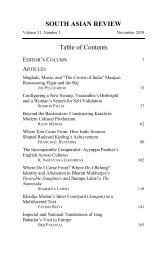2010 Winter Newsletter - South Asian Literary Association
2010 Winter Newsletter - South Asian Literary Association
2010 Winter Newsletter - South Asian Literary Association
You also want an ePaper? Increase the reach of your titles
YUMPU automatically turns print PDFs into web optimized ePapers that Google loves.
PAGE 13<br />
“impossibility theorem” by claiming happiness for each single<br />
individual based on their demands. What is amazing to see in<br />
Sen’s critique is the awareness about the marginalized communities<br />
in the western world—especially the immigrants<br />
who constantly readjust and readapt as nomads. Based on<br />
this theory, I will analyze the various immigrant characters<br />
from Chitra Banerjee Divakaruni’s works and the major character<br />
in Stephen Spielberg’s film Terminal<br />
Navneet Kumar, University of Calgary, Canada<br />
Activist Realisms in Arundhati Roy’s Nonfiction Prose<br />
This paper explores activist realisms in the writings of<br />
Arundhati Roy on resistance vis-a-vis the works of the sociologist,<br />
Ulrich Beck. I argue that Roy’s realism lies in constructing<br />
a model of resistance against forces of corporate globalization,<br />
neofascism, Hindutva, and sectarianism which essentially<br />
hinges on the idea of collective solidarity and the notion of<br />
identifying an adversary. In The Reinvention of Politics, Ulrich<br />
Beck challenges both these aspects of Roy’s writings in proposing<br />
a politics that eliminates the notion of the adversary, in<br />
addition to denying collective solidarities. For Beck, the adversarial<br />
model of politics, exemplified here by Roy, has become<br />
obsolete to deal with issues of terror and sectarianism. I<br />
argue that Beck’s understanding of resistance, even as it declares<br />
the end of adversarial model of politics, sidetracks political<br />
struggles which incidentally are crucial to Roy’s politics<br />
and propose that Roy’s model of realistic politics is more effective<br />
in dealing with consciousness raising than Beck’s<br />
claims.<br />
Nukhbah Langah, Forman Christian College University, Lahore,<br />
Pakistan<br />
Sufi Realism or Political Realism: Pakistani <strong>South</strong> Punjab<br />
and Contemporary Siraiki Poetry<br />
This paper focuses on the genre of Siraiki kafi. I observe Siraiki<br />
mystic poet, Khwaja Ghulam Farid’s (1845-1901) kafis as<br />
a fusion of Sufism vs. literary realism and trace his influences<br />
on contemporary poet, Riffat Abbas. I contend that while<br />
maintaining spiritual ties with his motherland, fortified<br />
through the symbol of Rohi desert, Farid’s idealization of<br />
such symbols negate the realistic aspects of his poetry. This<br />
paradox and the current political milieu, together, have further<br />
complicated Abbas’s kafi expression that has now diverted<br />
from traditional mystic philosophy initially associated with<br />
Farid.<br />
Harveen Mann, Loyola College, Chicago, IL<br />
“Disciplined Soldiers of Indian Freedom": Women and the<br />
Narrativizing of Quit India<br />
Taking my cue from Aruna Asaf Ali's observation that women<br />
participated in the Quit India Movement "as disciplined<br />
soldiers of Indian freedom," I will assess their wide-ranging<br />
participation--national and grassroots, pacifist and militant,<br />
elite and subaltern, urban and rural. And to underscore the<br />
ideological, methodological, and religion-, region-, class-, and<br />
caste-based heterogeneity of their resistance, I will examine<br />
their diverse narrativizing of Quit India in selected autobiographies<br />
and biographies, as well as oral history transcripts,<br />
letters, interviews, and political pamphlets.<br />
Parvinder Mehta, Wayne State University, Detroit, MI<br />
Predicaments of History and Mimetic Agency: Postcolonial<br />
Return, Repetition and Remediation in “Rang De Basanti”<br />
In Rakeysh Omprakash Mehra’s popular film, “Rang De<br />
Basanti” (2006) the interface between colonial history and<br />
postcolonial, contemporary India reveal an interesting narrative<br />
of history and its mimetic remediation by contemporary<br />
subjectivities. The film represents non-linear history in terms<br />
of what Mark Freeman calls as “spirals of remembrance, return,<br />
repetition and reconfiguration.” Offering diverse theoretical<br />
arguments about history and its narration, including<br />
thinkers like Nietzsche, Benjamin, Levinas, Foucault and Ricoeur,<br />
this paper will trace an aesthetic of mimeticism and rhetoric<br />
of history premised on ethical desire for transformative<br />
imperative in Rang De Basanti. A Levinasian analysis of the<br />
film will also highlight the distinctions between history framed<br />
in female discourse in terms of mourning and loss and the<br />
history re-visited in male discourse in terms of subjective, violent<br />
response.<br />
Rajiv Kannan Menon, New York University, New York, NY<br />
The Third World Below: “Kitchen Cosmopolitanisms” and<br />
Migrant Intimacies in Kiran Desai’s The Inheritance of Loss<br />
In one of the many intersecting narratives in Kiran Desai’s<br />
The Inheritance of Loss, Biju, an illegal Indian immigrant in<br />
New York City, takes on a series of low-paying jobs in restaurant<br />
kitchens in order to survive the violent realities of life in<br />
the United States. However, rather than solely presenting these<br />
private sites of employment as zones where cruelty can occur<br />
outside of the jurisdiction of a purportedly liberating public<br />
sphere of legality and tolerance, Desai suggests that these<br />
unseen locations of labor can enable productive forms of intimacy<br />
between members of the “shadow class.”<br />
This paper explores how private spaces of neocolonial exploitation<br />
foster intimacies that facilitate the construction of solidarities<br />
across boundaries of race and nationhood in Desai’s<br />
novel. Utilizing a realist mode to draw attention to these subaltern<br />
diasporas, Desai’s depiction of these marginal projects<br />
of cosmopolitanism reveal the potential for the creation of<br />
subversive solidarities in the spaces that celebrations of globalization<br />
render invisible.<br />
Namrata Mitra, Purdue University, IN<br />
NEWSLETTER<br />
What's funny about this Joke? Politics of Humor in Postcolonial<br />
Fiction<br />
Each time we laugh at a joke we reveal our own assumptions



